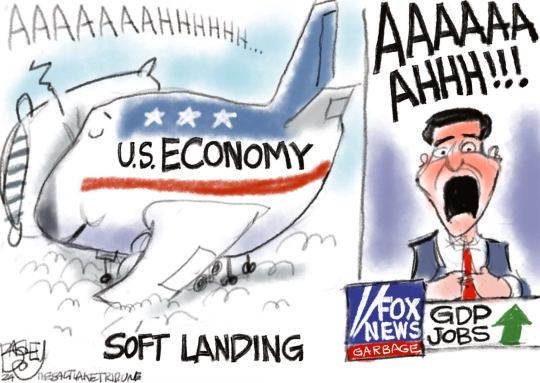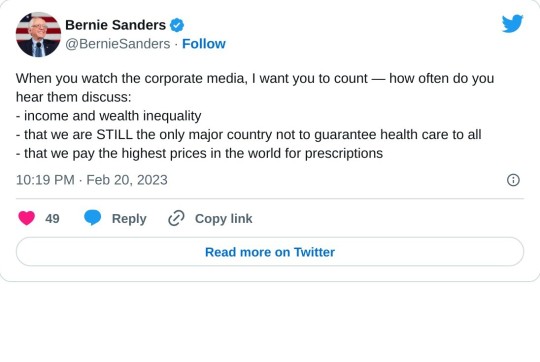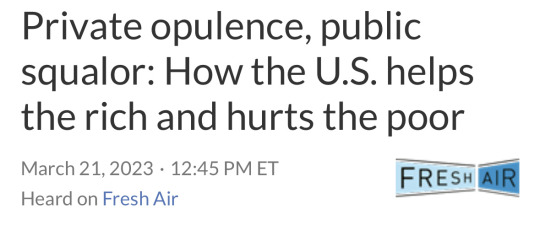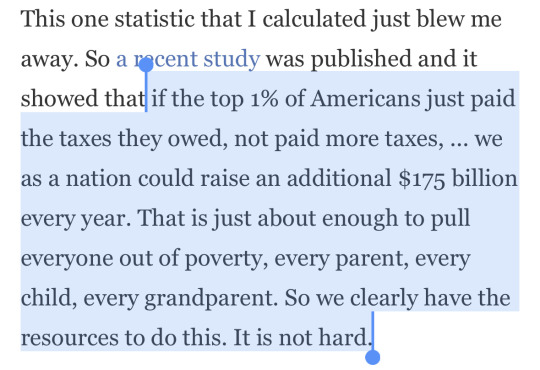#us income inequality
Explore tagged Tumblr posts
Link
#thewaronyou
12 notes
·
View notes
Link
2 notes
·
View notes
Text

Source

Source
Year after year and just keeps going
#politics#us politics#government#eat the rich#tax the rich#capitalism#elections#the left#twitter post#current events#news#campaign finance#us election#income inequality
4K notes
·
View notes
Text
It’s so funny reading any overview of American economics scholarship because all of them are like “yeah all their base assumptions are wrong and none of what they describe about the economy or labour market is true”
#it comes up so often in discussions of income inequality like there’s a universal section in every paper taking about the US that’s like#So economists say inequality is due to market forces but that’s wrong and here’s fifty studies showing the opposite#and also the assumption that everyone is an individual operating rationally is extra wrong#book club
124 notes
·
View notes
Text

America: See it before it ends.
(All the other memes I’ve made..)
#memes#politics#us politics#usa#usa usa usa#patriotism#empires#political memes#maga 2024#maga 2025#gop#amerika#oligarchy#collapse#secession#decline#american culture#geopolitics#polarization#income inequality#1%#greed#neoliberalism#see it before it ends#america#united states of america
23 notes
·
View notes
Text

Ain't that the truth.
#culture#leftism#politics#the left#progressive#us politics#eat the rich#tax the rich#communism#corporate greed#wealth inequality#fuck landlords#income inequality#inequality#housing crisis#Landlords are causing the housing crisis#the simpsons memes#lisa simpson#simpsons#classic cartoons#cartoons#animated series#animation#mems#tumblr memes#memes#funny memes#landlords are the worst#landlords are scum#landlords are parasites
20 notes
·
View notes
Video
tumblr
Debt Ceiling
#tiktok#debt ceiling#tax cuts for the rich#economy#economics#Manufacturing Consent#budget cuts#unemployment#health insurance#wealth inequality#wealth gap#hoarding wealth#generational wealth#wealth#income inequality#inequality#recession#economic crisis#us taxes#taxes
86 notes
·
View notes
Text

3 notes
·
View notes
Text

Pat Bagley, Salt Lake Tribune
* * * *
LETTERS FROM AN AMERICAN
January 19, 2024
HEATHER COX RICHARDSON
JAN 19, 2024
President Joe Biden today signed the continuing resolution that will keep the government operating into March.
Meanwhile, the stock market roared as two of the three major indexes hit new record highs. The S&P 500, which measures the value of 500 of the largest companies in the country, and the Dow Jones Industrial Average, which does the same for 30 companies considered to be industry leaders, both rose to all-time highs. The third major index, the Nasdaq Composite, which is weighted toward technology stocks, did not hit a record high, although its 1.7% jump was higher than that of the S&P 500 (1.2%) or the Dow (1.1%).
Investors appear to be buoyed by the fact the rate of inflation has come down in the U.S. and by news that consumers are feeling better about the economy. A report out today by Goldman Sachs Economics Research noted that consumer spending is strong and predicted that “job gains, positive real wage growth, will lead to around 3% real disposable income growth” and that “household balance sheets have strengthened.” It also noted that “[t]he US has led the way on disinflation,” and it predicted further drops in 2024. That will likely mean the sort of interest rate cuts the stock market likes.
The economic policies of the Biden-Harris administration have also benefited workers. The unemployment rate has been under 4% for more than two years, and wages have risen higher than inflation in that same period. Production is up as well, to 4.9% in the third quarter of 2023 (the U.S. growth rate under Trump even before the pandemic was 2.5%).
The administration has worked to end some of the most obvious financial inequities in the U.S., such as the unexpected “junk fees” tacked on to airline or concert tickets, or to car or apartment rentals. On Wednesday the Consumer Financial Protection Bureau announced a proposed rule for bank overdraft fees at banks that have more than $10 billion in assets.
While banks now can charge what they wish if a customer’s balance falls below zero, the proposed rule would allow them to charge no more than what it cost them to break even on providing overdraft services or, alternatively, an industry-wide fee that reflects the amount it costs to deal with overdrafts: $3, $6, $7, or $14. The amount will be established after a public hearing period.
Ken Sweet and Cora Lewis of the Associated Press note that while the average overdraft is $26.61, some banks charge as much as $39 per overdraft. The CFPB estimates that in the past 20 years, banks have collected more than $280 billion in overdraft fees. (One bank’s chief executive officer named his boat “Overdraft.”) Over the past two years, pressure has made banks cut back on their fees and they now take in about $8 billion a year from those overdraft fees.
Bankers say regulation is unnecessary and will force them to end the overdraft service, pushing people out of the banking system. Biden said that the rule would save U.S. families $3.5 billion annually.
The administration has also addressed the student loan crisis by reexamining the loan histories of student borrowers. An NPR investigation led by Cory Turner revealed that banks mismanaged loans, denying borrowers the terms under which they had signed on to them. Rather than honoring the government’s promise that so long as a borrower paid what the government thought was reasonable on a loan for 20 or 25 years (undergrad or graduate), the debt would be forgiven, banks urged borrowers to put the loan into “forbearance,” under which payments paused but the debt continued to accrue interest, making the amount balloon.
The Education Department has been reexamining all those old loans to find this sort of mismanagement as well as other problems, like borrowers not getting credit for payments to count toward their 20 years of payments, or borrowers who chose public service not receiving the debt relief they were promised.
Today the administration announced $4.9 billion of student debt cancellation for almost 74,000 borrowers. That brings the total of borrowers whose debt has been canceled to 3.7 million Americans, with an erasure of $136.6 billion. Nearly 30,000 of today’s relieved borrowers had been in repayment for at least 20 years but never got the relief they should have; nearly 44,000 had earned debt forgiveness after 10 years of public service as teachers, nurses, and firefighters.
Biden has been traveling the country recently, touting how the economic policies of the Biden-Harris administration have benefited ordinary Americans. In Emmaus, Pennsylvania, last Friday he visited a bicycle shop, a running shoe store, and a coffee shop to emphasize how small businesses are booming under his administration: in the three years since he took office, there have been 16 million applications to start new businesses, the highest number on record.
Biden was in Raleigh, North Carolina, yesterday to announce another $82 million in support for broadband access, bringing the total of government infrastructure funding in North Carolina during the Biden administration to $3 billion.
On social media, the administration compared its investments in the American people to those of President Franklin Delano Roosevelt’s New Deal in the 1930s, which were enormously popular.
They were popular, that is, until those opposed to business regulation convinced white voters that the government’s protection of civil rights, which came along with its protection of ordinary Americans through regulation of business, provision of a basic social safety net, and promotion of infrastructure, meant redistribution of white tax dollars to undeserving Black people.
The same effort to make sure that ordinary Americans don’t work together to restore basic fairness in the economy and rights in society is visible now in the attempt to attribute a recent Boeing airplane malfunction, in which a door panel blew off mid-flight, to diversity, equity, and inclusion (DEI) efforts. Tesnim Zekeria at Popular Information yesterday chronicled how that accusation spread across the right-wing ecosystem and onto the Fox News Channel, where Fox Business host Sean Duffy warned: “This is a dangerous business when you’re focused on DEI and maybe less focused on engineering and safety.”
As Zekeria explains, “this narrative has no basis in fact.” Neither Boeing nor its supplier, Spirit AeroSystems, is particularly diverse, either at the workforce level, where minorities make up 35% of Boeing employees and 26% of those at Spirit AeroSystems, or on the corporate ladder, where the overwhelming majority of executives are white men. Zekeria notes that right-wing media figures have also erroneously blamed last year’s train derailment in Ohio and the collapse of the Silicon Valley Bank on DEI initiatives.
The real culprit at Boeing, Zekeria suggests, was the weakened regulations on Boeing and Spirit thanks to more than $65 million in lobbying efforts.
Perhaps an even more transparent attempt to keep ordinary Americans from working together is the attacks former Fox News Channel personality Tucker Carlson has launched against Vice President Kamala Harris, calling her “a member of the new master race” who “must be shown maximum respect at all times, no matter what she says or does.” Philip Bump of the Washington Post noted yesterday that this construction suggests that Harris, who identifies as both Black and Indian, represents all nonwhite Americans as a united force opposed to white Americans.
But Harris’s actions actually represent something else altogether. She has crossed the country since June 2022, when the Supreme Court overturned the 1973 Roe v. Wade decision that recognized the constitutional right to abortion, talking about the right of all Americans to bodily autonomy. That the Supreme Court felt able to take away a constitutional right has worried many Americans about what they might do next, and people all over the country have been coming together in opposition to the small minority that appears to have taken over the levers of our democracy.
Driving the wedge of racism into that majority coalition seems to be a desperate attempt to stop ordinary Americans from taking back control of the country.
LETTERS FROM AN AMERICAN
HEATHER COX RICHARDSON
#Letters from An American#Heather Cox Richardson#US Economy#Kamala Harris#reproductive rights#women's rights#income inequality#student loans#stock market
10 notes
·
View notes
Text
No free rides for old money! - Pass The Billionaires Income Tax Act! (S. 3367)
I am writing to express my strong support for the proposed S. 3367 bill, which aims to amend the Internal Revenue Code of 1986. This legislation represents a crucial step towards achieving economic justice by seeking to eliminate tax loopholes that have allowed billionaires to defer taxes indefinitely. By doing so, we would be ensuring a fairer distribution of wealth and rectifying a system that has long favored the ultra-wealthy. Additionally, the bill modifies over 30 tax provisions, requiring billionaires to contribute annually. It's time to ensure that those with the most significant influence and wealth contribute proportionately to our society's well-being. Therefore, I urge you to support and pass the Billionaires Income Tax Act.
Billionaires have amassed vast wealth, often at the expense of their employees who struggle to make ends meet on minimum wages. It is only just and equitable that they pay their employees a living wage AND contribute proportionally to the betterment of our society.
Furthermore, if billionaires wield significant influence over our government and policy-making, they should demonstrate their commitment by financially supporting the very system that has allowed them to prosper. No longer should they enjoy free rides on the backs of hardworking taxpayers. It is past time to ensure that billionaires are contributing their fair share to the well-being of our country.
Passing the Billionaires Income Tax Act is not only a matter of fiscal responsibility but also a moral imperative. It is time to ensure that our tax system is fair and equitable for all, not just the wealthy few.
Thank you for considering my views on this important issue. I urge you to stand on the side of fairness and justice by supporting S.3367.
No free rides for old money!
📱 Text SIGN POZZVN to 50409
🤯 Liked it? Text FOLLOW IVYPETITIONS to 50409
#eat the rich#Wealth Redistribution#ivy petitions#open letter#S. 3367#Billionaires Income Tax Act#Tax Reform#economic justice#us politics#taxes#tax the rich#billionaires should not exist#Tax Fairness#Wealth Distribution#oligarchy#Tax Loopholes#Tax Provisions#Billionaires Tax#Living Wage#Tax Responsibility#Policy Change#Government Influence#Social Justice#Fair Taxation#Income Inequality#Progressive Taxation#Wealth Gap#Tax Policy#Tax Reform Now#Billionaire Responsibility
8 notes
·
View notes
Text

#us politics#2023#twitter#tweet#sen. bernie sanders#corporate media#income inequality#wealth inequality#universal healthcare#universal health coverage#lower prescription drug prices#bernie for the people#bernie gets it#progressives#progressive caucus#progressive politics
64 notes
·
View notes
Text
"Budgeting, in the everyday sense of measuring the cost of each purchase or decision, is something I have to think about. Chase Bank CEO Jamie Dimon said he “would have to think about it” too—but only when I pressed him in a congressional hearing on how a teller at his bank could make ends meet.
Using a whiteboard to break down the wages and costs of living, I switched to a red marker as the hypothetical single mother I was describing ran short paying for food and childcare. “My question for you, Mr. Dimon, is how should she manage this budget shortfall while she is working full-time at your bank?”
“I don’t know that all your numbers are accurate. That number is a…It is generally a starter job?” He chipped away at the question to avoid an answer.
“She is a starting employee. She has a six-year-old child. This is her first job.”
...
“She’s short $567. What would you suggest she do?” I pressed.
“I don’t know; I’d have to think about it,” he answered. I asked whether the teller should borrow on her Chase credit card, or if she should overdraft her checking account, noting that the monthly budget did not even allow for clothing, medicine, or school lunches. Each time, he repeated that he would have to think about it.
As the exchange was replayed online millions of times, my colleagues asked me how I’d thought of this line of questioning. More than Mr. Dimon’s refusal to acknowledge the mismatch between worker pay and household expenses, the wonder of my fellow representatives disheartened me. For all the bloviating about Democrats being “for the people” and Republicans advancing “a pro-worker agenda,” I confounded politicians on both sides of the aisle by raising that exact topic."
#income inequality#pay workers#us house of representatives#katie porter#i swear: politics is messier than my minivan#rich congressmembers forget reality
13 notes
·
View notes
Text
me trying not to reblog posts just to pedantically correct them

#saw a post claiming the median income in the usa was only like 24k. it’s not lmao??? one quick google search will tell you otherwise???#like the lowest median income out of every state in the us in 2023 was still 37k…#the overall median for the whole us was $48k.#not saying that the point of the post (income inequality is huge in the usa) is not correct! but!!!!!#stop saying wrong things on the internet it annoys meeee!!!!!#talk tag
2 notes
·
View notes
Text


Source
#eat the rich#capitalism#tax the rich#taxes#politics#us politics#income inequality#wealth tax#wealth inequality#socioeconomic inequality#poverty
22K notes
·
View notes
Text

Kill colonizers/
#The thing about HI politics are that they are more bananas than you could ever imagine#I think a lot of smoke screening really distracts from who the biggest offenders are (us based corporations who own huge quantities of land#(While also containing to climate change and income inequality)
7 notes
·
View notes